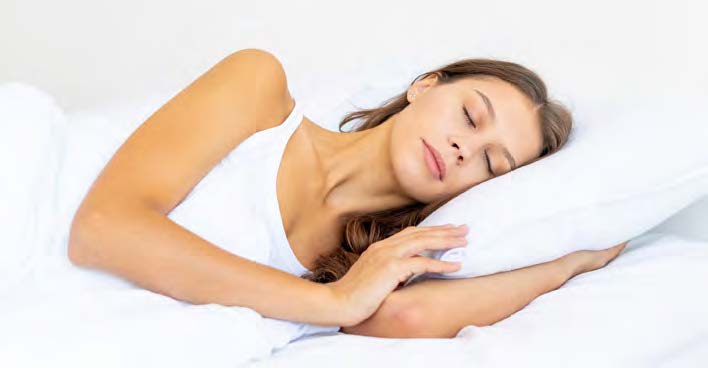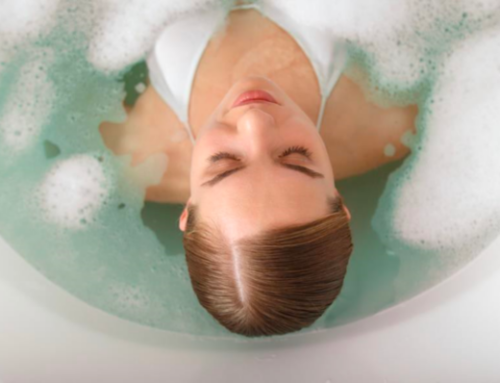Getting enough sleep
is one of the best things
we can do
for our health.

Sleep offers rejuvenating benefits for both the mind and body, giving us better mental focus and physical strength. It’s also vital for disease prevention and promoting longevity. Sleep has tremendous benefits for our mood and directly impacts our ability to enjoy life.
However, so many people struggle to sleep well consistently. From chronic pain to stress to illness, many factors can interrupt our sleep. Finding healthy ways to help improve sleep can drastically increase our quality of life. Hydrotherapy is an effective way to help you relax and manage stress, and it may even help relieve pain—all of which help you get the sleep you need.
Learn more about the benefits of sleep and how to help improve your sleep quality with hydrotherapy bathtubs. Hydrotherapy baths help relieve stress, boost mood, reduce chronic pain and can be used as a peaceful bath ritual.
Importance of Sleep for Health and Well-Being
We all know the difference between getting enough and getting too little sleep. When we sleep well, we feel refreshed, focused and energized. When we sleep poorly, we feel lousy. Besides ensuring we feel great the next day, what purpose does sleep serve?
There are a few different theories as to why sleep is so essential for our health:
- As we evolved, sleep kept us inactive at night to help conserve energy for the next day.
- When we damage muscles and tissues, sleep allows us to restore and regenerate our bodies.
- When we learn new information, sleep helps our brains with memory formation.
With these different theories in mind, here are a few of the many benefits people experience when they get good quality sleep:
Stronger Immune Function
Getting enough high-quality sleep is essential to a high-functioning immune system.
Researchers say that during sleep, our bodies produce T cells, which are immune system cells that find and attack viruses. When we don’t get enough sleep, our body actually suppresses the production of T cells. That’s because we produce fewer stress hormones during sleep, and stress hormones inhibit T cells.
Not only does a lack of sleep make you more susceptible to infections, but it can also prolong the amount of time it takes you to recover from illness.
Improved Attention and Focus
Sleep has a major role to play in brain health. Not only does being well-rested keep you alert, but it also helps you to retain and recall information. Studies have found that being sleep deprived has similar effects on your ability to focus as alcohol intoxication.
Getting enough sleep, however, improves your problem-solving and learning skills.
Getting enough sleep is one of the best things we can do for our health. Being well-rested is also good for your mental health. People who get sufficient amounts of sleep are less likely to experience negative moods.
Reduced Risk of Chronic Disease
Poor sleep quality is linked with numerous chronic diseases. Heart disease, stroke and type 2 diabetes are particularly common diseases associated with insufficient sleep.
Because sleep provides an opportunity for repair, not getting enough rest impedes your body’s ability to recuperate from stress, which puts added strain on your heart.
With diabetes, poor sleep may reduce insulin sensitivity and increase the risk of secondary symptoms of diabetes, like hardened arteries. Getting
plenty of high-quality sleep can help you prevent or manage these chronic diseases.
About Sleep Disorders
The average adult needs between 7 and 9 hours of sleep every night. But according to the CDC, roughly one-third of U.S. adults aren’t getting enough sleep on a regular basis. Everyone experiences sleep disturbances from time to time, but when it becomes the norm, it could indicate a potential sleep disorder.
Roughly 70 million American adults experience chronic problems sleeping.
There are a variety of sleep problems people can experience to different degrees. Some sleep disorders are very serious and can significantly disrupt a person’s quality of life.
Here are some of the types of sleep disorders and how they affect people:
- Insomnia: Characterized by the inability to fall asleep and stay asleep, insomnia is the most common sleep disorder.
- Sleep apnea: When people experience obstructed breathing during sleep, they may have a treatable condition called sleep apnea.
- Restless leg syndrome: If you experience an uncontrollable urge to move your legs while you’re trying to sleep, you may have restless leg syndrome, also known as Willis-Ekbom disease.
- Narcolepsy: People who experience extreme sleepiness during the day may have narcolepsy, which causes them to suddenly fall asleep at any time.
If you suspect you have a sleep disorder, it’s important to consult a medical professional. Most sleep
disorders are treatable.
What Causes Sleep Disorders and Poor Sleep?
There are many possible causes for getting a bad sleep or even developing a clinical sleep disorder. Insomnia, which is the most common sleep disturbance issue, has a few potential risk factors. For many people, it may be a combination of mental and physical health issues, as well as environmental factors.
If you’re experiencing sleep disturbances, here are some of the factors that could be interfering with your sleep:
- Stress: Racing thoughts at bedtime, such as worries about work, family or finances, can prevent us from falling asleep and staying asleep. Stress keeps the body in a state of hyperarousal, which prevents the brain from releasing sleep hormones. This can also cause a vicious circle—not being able to sleep causes you to become even more stressed, which further prevents you from sleeping.
- Anxiety and depression: Sleep disturbances are a common symptom of depression or anxiety disorders. As with stress, feeling anxious can prevent your body from producing sleep hormones, which is especially common in people coping with a recent traumatic event, such as the death of a loved one or a serious health diagnosis. With depression, people tend to sleep more during the day, which can prevent them from being tired enough to sleep through the night.
- Chronic pain: Illnesses that cause chronic pain, such as arthritis, multiple sclerosis or cancer, can interfere with everyday life, including sleep. When you’re in chronic pain, it’s hard to relax and get comfortable enough to fall asleep. Some reports suggest that as many as 50% of people who experience insomnia also have a chronic pain disorder.
- Poor sleep hygiene: Sleep hygiene refers to the need for increasing the behaviors that promote sleep and decreasing those that prevent sleep. Poor sleep hygiene practices might include drinking too much caffeine late in the day or spending too much time on your phone or computer before bed.
Many of these causes of poor sleep can be managed through simple changes to daily lifestyle behaviors.Finding healthy habits that help encourage well-being can drastically improve our sleep quality each night.
Natural Treatments for Sleep
If you’re experiencing sleep disturbances, you need a natural remedy to sleep better. There are ways to improve sleep quality without the need for sleep aids, which are meant for short-term use only.
Many of the risk factors for poor sleep quality can be mitigated by making lifestyle changes that directly address the factors leading to poor sleep.
According to experts, here are some of the top natural ways to get better sleep:
- Manage and reduce stress: Since stress is one of the leading reasons why people have difficulty falling asleep and staying asleep, it’s worthwhile developing healthy stress-management practices as a natural remedy for sleep. Meditation, deep breathing, journaling and listening to peaceful music are all proven ways to ease your mind.
- Address chronic pain: Heat and cold therapy, as well as massage, are natural ways to reduce inflammation, alleviate pain and help you sleep better. It’s important to have pain management strategies that will help you find comfort while you sleep.
- Increase physical activity: Physical activity has been positively linked with improved sleep. Scientists believe that when you exercise, your body releases important hormones that help us sleep better at night. Exercise is also a way to reduce stress, which can prevent sleep disturbances. Additionally, exercise is considered one of the natural treatments for sleep apnea, because it helps with weight loss.
- Create a bedtime routine: Having a peaceful and relaxing bedtime routine can help improve sleep. Doing the same routine each night trains the brain that it’s time for bed, triggering the release of melatonin — a crucial sleep hormone. Whatever your sleep routine, it should include activities aimed at helping you relax and unwind before bed.
A combination of the above natural remedies for sleep problems can increase your overall well-being and help you get deeper and higher quality rest each night.
Benefits of Hydrotherapy Spa for Sleep
Hydrotherapy is a home remedy that may help you get better sleep. As a natural way to help alleviate stress and reduce pain, hydrotherapy for sleep disorders may help address some of the causes of insomnia and sleep disorders.
What is hydrotherapy treatment? Throughout history, many cultures have promoted the benefits of therapeutic bathing. Hot and warm water baths help us relax and trigger a variety of physiological actions that may help promote natural healing. Today, we can experience hydrotherapy from the comfort of our homes with whirlpool jetted bathtubs. Pressurized jets help us to target tense areas of the body, delivering soothing warm-water massage.
Below are some of the potential health benefits of hydrotherapy as a natural remedy for restless sleep:
1. May Relieve Stress
Everyone experiences stress from time to time — it’s part of our natural survival system to protect us from threats. However, in modern times, we don’t experience the same type of threats our ancestors did. Instead, we deal with daily stressors like work, family and finances. As a result, many of us remain in a
constant but low-grade state of stress.
Without stress-management practices, we may remain in a heightened state of alertness, which takes its toll on our mental health. Over time, our sleep quality can suffer if we’re not achieving true relaxation regularly.
To sleep better, you need healthy ways to relax whenever you feel stressed. Unwinding before bed helps put your body in a state of relaxation, which allows your mind to let go of racing thoughts while your body prepares for sleep. Being in a state of relaxation at bedtime also ensures that your brain can produce enough of the sleep hormone melatonin to make you feel tired enough to sleep through the night.
Taking a hot hydrotherapy massage bath can help you relax and may relieve stress before bed.
Hydrotherapy bathtubs, such as jetted whirlpool tubs and air massage tubs, deliver a deeply peaceful experience. Immersing yourself in a hot bath helps physically release tension. As your body relaxes, so will your mind.
As you soak in your hydromassage bathtub, try practicing additional relaxation exercises, such as deep breathing, meditation or progressive muscle relaxation to help further melt your stress away.
2. Can Help Boost Mood
Spending time in water is known to help improve mood. According to the CDC, people who swim or do aquatic exercise report that they enjoy water-based exercise more than exercises on land.
A 2008 clinical trial found that eight months of physical training in warm water improved long-term mental health in people with fibromyalgia. Specifically, the warm water activity reduced their symptoms of anxiety and depression.
Warm water soaking combined with the soothing benefits of hydromassage can help improve mood, making hydrotherapy a potential natural remedy for sleep and anxiety.
Experiencing mood symptoms is one of the major obstacles to getting a good night’s sleep. According to sleep researchers at Harvard, anxiety and depression increase agitation, making it difficult to sleep. In fact, difficulty sleeping is often one of the first symptoms of depression.
Finding healthy ways to boost your mood can have a significant impact on your quality of life, including improving your sleep quality. Hydromassage therapy may be a natural remedy for sleep insomnia by helping to boost your mood and achieve greater mental well-being.
3. Helps Alleviate Chronic Pain
Chronic pain is a major obstacle to all aspects of well-being, including sleep. An estimated 50 million U.S. adults experience chronic pain. Whether it’s from an illness or a muscle injury, chronic pain can have many sources.
Chronic pain can negatively impact daily life and trap people in a vicious circle of poor health. Experiencing chronic pain makes it difficult to sleep and exercise. People who experience high levels of chronic pain can also develop depression, anxiety and other mood disorders.
Finding safe and healthy ways to manage chronic pain can drastically improve your quality of life. Natural pain-relief therapies can help increase your mobility so you can exercise more. They can help you feel more comfortable so you can fall asleep and stay asleep. They can also help improve your mood so you can find enjoyment in life.
Hydromassage therapy may be a natural, safe and affordable way to help manage chronic pain because it combines two natural therapies in one solution—heat therapy and massage therapy.
Hydromassage therapy benefits for pain relief may include:
• Relieves painful muscle tension and soreness through exposure to warm or hot water
• Promotes increased blood circulation to help repair damaged tissues
• Provides trigger point release on localized pain due to the placement of pressurized jets
• Improves psychological outcomes of living with chronic pain
Hydromassage therapy may help you manage painful conditions, including:
• Arthritis, such as osteoarthritis, rheumatoid arthritis and ankylosing spondylitis
• Multiple sclerosis and other nervous system diseases
• Fibromyalgia and non-arthritic joint pain
• Sports injuries and delayed onset muscle soreness
When used regularly, hydromassage therapy can help provide short term and ongoing pain relief as a natural remedy for better sleep.
4. Provides a Peaceful Bedtime Ritual
Getting into a routine before bed is one of the easiest lifestyle shifts you can make to improve your sleep quality. A bedtime routine should include activities that promote relaxation and help you fall into deep slumber. To create a relaxing bedtime routine, you’ll want to do things that soothe both your mind and body.
One of the most popular bedtime routines is taking a warm bath each night.
Hydrotherapy bathtubs are designed to provide the ultimate relaxation experience. Not only do warm water massage jets feel great on your sore and tired muscles, but they also provide a peaceful experience that can help your mind relax.
There are many ways to make your before-bed bath a deeply relaxing ritual.
You can create a five senses experience by adding aromatherapy oils to the bathwater. Essential oils like lavender, bergamot and chamomile are all associated with tranquility. To further help you sink into blissful relaxation, play some soft music or listen to a guided meditation. Some hydrotherapy bath models also include chromotherapy lighting systems that create a harmonious healing environment.
Turning your bathroom into a spa-like sanctuary may help reduce stress, ease tension and prepare you for bed so you can get the rejuvenating sleep you need.
Try Hydrotherapy Bathtubs for Better Sleep
Get the perfect wellness solution at home with hydrotherapy massage bathtubs. Investing in a hydrotherapy bathtub is an investment in your overall well being. Experiencing relaxing hydrotherapy massage every day can help boost mood, relieve stress, ease pain and contribute to better quality sleep.
Hydrotherapy bathtubs come in hundreds of packages and configurations, allowing you to find the one that meets your preferences.
With several different jet styles to choose from, you can also select the massage experience that will help provide you with pain relief from joint and muscle soreness. Add any of the dozens of different wellness features and accessories available, and you can design the ideal home retreat for your daily relaxation experience.
From whirlpool jetted bathtubs to oxygen soak therapy tubs to freestanding and walk-in baths, the perfect luxury bathtub model awaits you. Discover all the benefits of hydrotherapy massage with your own jetted bathtub today.






